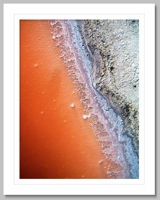Difference between revisions of "Evaporation"
(Created page with 'File:lighterstill.jpgright|frame ==Etymology== [http://nordan.daynal.org/wiki/index.php?title=English#ca._1100-1500_.09THE_MIDDLE_ENG...') |
m (Text replacement - "http://" to "https://") |
||
| (One intermediate revision by the same user not shown) | |||
| Line 2: | Line 2: | ||
==Etymology== | ==Etymology== | ||
| − | [ | + | [https://nordan.daynal.org/wiki/index.php?title=English#ca._1100-1500_.09THE_MIDDLE_ENGLISH_PERIOD Middle English], from Latin evaporatus, past participle of evaporare, from e- + vapor steam, vapor |
| − | *Date: [ | + | *Date: [https://www.wikipedia.org/wiki/15th_Century 15th century] |
==Definitions== | ==Definitions== | ||
*1 a : to [[convert]] into [[vapor]]; also : to dissipate or draw off in vapor or fumes | *1 a : to [[convert]] into [[vapor]]; also : to dissipate or draw off in vapor or fumes | ||
| Line 14: | Line 14: | ||
Evaporation is a type of [[phase]] [[transition]]; it is the [[process]] by which [[molecules]] in a [[liquid]] state (e.g. [[water]]) [[spontaneously]] become [[gaseous]] (e.g. water vapor). Generally, evaporation can be seen by the [[gradual]] disappearance of a [[liquid]] from a substance when exposed to a significant volume of [[gas]]. Vaporization and evaporation however, are not entirely the same processes. | Evaporation is a type of [[phase]] [[transition]]; it is the [[process]] by which [[molecules]] in a [[liquid]] state (e.g. [[water]]) [[spontaneously]] become [[gaseous]] (e.g. water vapor). Generally, evaporation can be seen by the [[gradual]] disappearance of a [[liquid]] from a substance when exposed to a significant volume of [[gas]]. Vaporization and evaporation however, are not entirely the same processes. | ||
| − | On [[average]], the [[molecules]] in a glass of [[water]] do not have enough [[heat]] [[energy]] to escape from the [[liquid]]. With sufficient heat, the liquid would turn into vapor quickly (see [ | + | On [[average]], the [[molecules]] in a glass of [[water]] do not have enough [[heat]] [[energy]] to escape from the [[liquid]]. With sufficient heat, the liquid would turn into vapor quickly (see [https://en.wikipedia.org/wiki/Boiling_point boiling point]). When the [[molecules]] collide, they [[transfer]] [[energy]] to each other in varying [[degrees]], based on how they collide. Sometimes the [[transfer]] is so one-sided for a [[molecule]] near the [[surface]] that it ends up with enough [[energy]] to [[escape]]. |
[[Liquid]]s that do not evaporate visibly at a given [[temperature]] in a given [[gas]] (e.g. cooking oil at room [[temperature]]) have [[molecules]] that do not tend to [[transfer]] [[energy]] to each other in a [[pattern]] sufficient to frequently give a [[molecule]] the heat [[energy]] [[necessary]] to turn into vapor. However, these liquids are evaporating. It is just that the [[process]] is much slower and thus significantly less visible. | [[Liquid]]s that do not evaporate visibly at a given [[temperature]] in a given [[gas]] (e.g. cooking oil at room [[temperature]]) have [[molecules]] that do not tend to [[transfer]] [[energy]] to each other in a [[pattern]] sufficient to frequently give a [[molecule]] the heat [[energy]] [[necessary]] to turn into vapor. However, these liquids are evaporating. It is just that the [[process]] is much slower and thus significantly less visible. | ||
| − | Evaporation is an [[essential]] part of the [ | + | Evaporation is an [[essential]] part of the [https://en.wikipedia.org/wiki/Water_cycle water cycle]. [[Solar]] [[energy]] drives evaporation of water from [[oceans]], [[lakes]], moisture in the [[soil]], and other sources of [[water]]. In [https://en.wikipedia.org/wiki/Hydrology hydrology], evaporation and [https://en.wikipedia.org/wiki/Transpiration transpiration] (which involves evaporation within [[plant]] [https://en.wikipedia.org/wiki/Stomata stomata]) are collectively termed [https://en.wikipedia.org/wiki/Evapotranspiration evapotranspiration]. Evaporation is caused when [[water]] is exposed to [[air]] and the [[liquid]] [[molecules]] turn into water vapor which rises up and forms clouds.[https://en.wikipedia.org/wiki/Evaporation] |
[[Category: Physics]] | [[Category: Physics]] | ||
Latest revision as of 01:13, 13 December 2020
Etymology
Middle English, from Latin evaporatus, past participle of evaporare, from e- + vapor steam, vapor
- Date: 15th century
Definitions
- b : to deposit (as a metal) in the form of a film by sublimation
- 2 a : to expel moisture from
- b : expel <evaporate electrons from a hot wire>
Description
Evaporation is a type of vaporization of a liquid, that occurs only on the surface of a liquid. The other type of vaporization is boiling, that instead occurs on the entire mass of the liquid. Evaporation is also part of the water cycle.
Evaporation is a type of phase transition; it is the process by which molecules in a liquid state (e.g. water) spontaneously become gaseous (e.g. water vapor). Generally, evaporation can be seen by the gradual disappearance of a liquid from a substance when exposed to a significant volume of gas. Vaporization and evaporation however, are not entirely the same processes.
On average, the molecules in a glass of water do not have enough heat energy to escape from the liquid. With sufficient heat, the liquid would turn into vapor quickly (see boiling point). When the molecules collide, they transfer energy to each other in varying degrees, based on how they collide. Sometimes the transfer is so one-sided for a molecule near the surface that it ends up with enough energy to escape.
Liquids that do not evaporate visibly at a given temperature in a given gas (e.g. cooking oil at room temperature) have molecules that do not tend to transfer energy to each other in a pattern sufficient to frequently give a molecule the heat energy necessary to turn into vapor. However, these liquids are evaporating. It is just that the process is much slower and thus significantly less visible.
Evaporation is an essential part of the water cycle. Solar energy drives evaporation of water from oceans, lakes, moisture in the soil, and other sources of water. In hydrology, evaporation and transpiration (which involves evaporation within plant stomata) are collectively termed evapotranspiration. Evaporation is caused when water is exposed to air and the liquid molecules turn into water vapor which rises up and forms clouds.[1]
